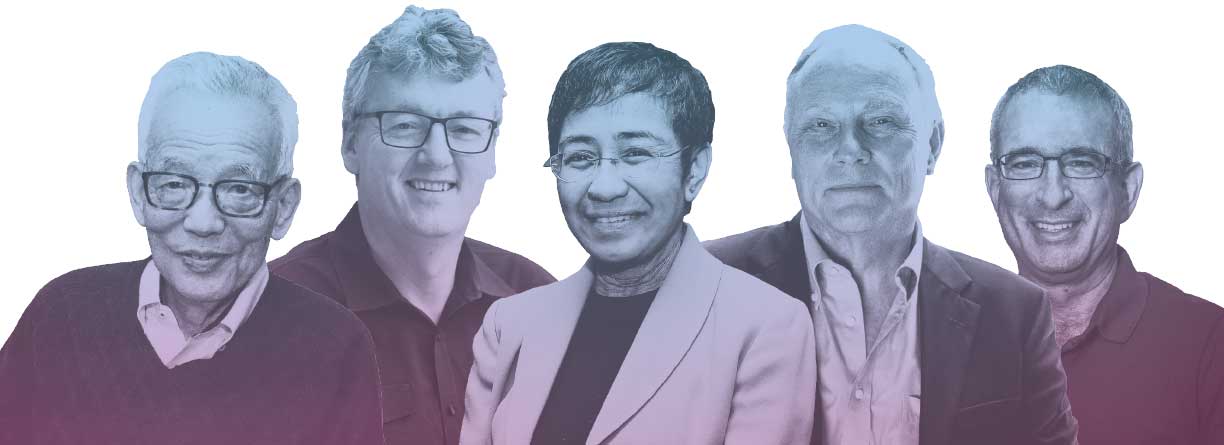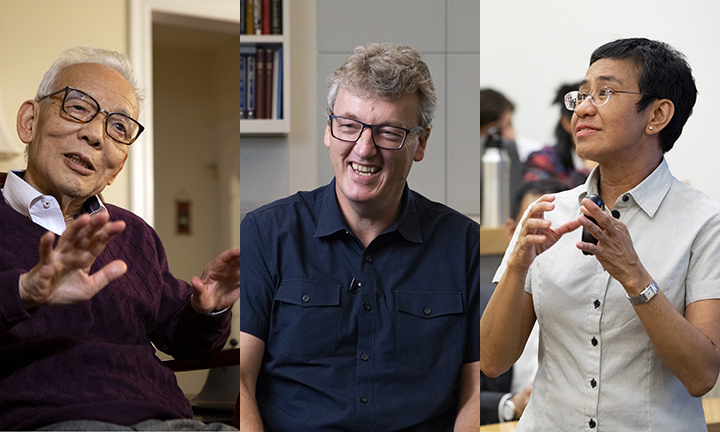Five Princeton Alumni and Faculty Receive 2021 Nobel Prizes
Princeton alumni and faculty members had a banner year for Nobel Prizes, with five laureates honored in four of the six Nobel categories — including the only woman to be honored this year, Peace Prize winner Maria Ressa ’86, a journalist recognized for fighting for press freedom in the Philippines.
Other alumni and professors among the 13 new laureates are David Card *83 and Joshua Angrist *89 (economics) and faculty members Syukuro “Suki” Manabe (physics) and David MacMillan (chemistry). The Nobel Prize for each category includes a monetary award of 10 million Swedish kronor (about $1.14 million), which is often split among multiple recipients.
Manabe’s honor was the first of the Princetonians’ to be announced, on Oct. 5. A senior meteorologist in the Program in Atmospheric and Oceanic Sciences, Manabe and two co-winners in physics were honored for devising new methods to describe Earth’s climate and predict its long-term behavior, according to the Nobel press release. Manabe began modeling Earth’s climate in the 1960s, showing how increased levels of carbon dioxide in the atmosphere lead to higher temperatures on the Earth’s surface.
“He led the development of physical models of the Earth’s climate and was the first person to explore the interaction between radiation balance and the vertical transport of air masses,” the Royal Swedish Academy of Sciences said in a statement. “His work laid the foundation for the development of current climate models.”
Manabe and Klaus Hasselmann of the Max Planck Institute for Meteorology will share one-half of the physics award for laying “the foundation of our knowledge of the Earth’s climate and how humanity influences it,” according to the Nobel press release. Giorgio Parisi of the Sapienza University of Rome was honored for discovering hidden patterns in disordered complex materials and will receive the other half.
Colleagues praised Manabe for his work and foundational contributions to climate science. “Climate models built on Manabe’s foundation are critical tools today for predicting and analyzing how the world will change as a result of greenhouse-gas emissions and to quantify the enormous benefit of rapidly decreasing greenhouse-gas emissions for life on Earth,” said Denise Mauzerall, a professor of civil and environmental engineering and public affairs, in Princeton’s announcement.
“I’ve always viewed Suki as the Michael Jordan of climate,” said Tom Delworth, senior scientist at the Geophysical Fluid Dynamics Laboratory (GFDL), at a press conference at Princeton. He said Manabe’s work has helped to elevate the field and that he continues to teach research papers based on Manabe’s early findings. “What you learn from those papers in the ’60s stands the test of time,” he said.
Manabe, 90, was born in Ehime-Ken, Japan, and earned his bachelor’s and Ph.D. degrees from the University of Tokyo. In 1958, he began working as a research meteorologist with the National Weather Service (now the National Oceanic and Atmospheric Administration). He came to Princeton in 1963 to lead the GFDL and began teaching at the University in 1968.
Noting that it took him some time to figure out what he was good at, Manabe encouraged students in the audience to find a career that aligns with their passions. The younger generation, he said, will have to find ways to both mitigate and adapt to the current changes in climate.
Asked if he foresaw the current climate crisis while experimenting over a half-century ago, Manabe said that he did not. “I never imagined that this thing I was beginning to study [would have] such huge consequences,” Manabe said. “I was doing it just because of my curiosity.”
The next day, the Royal Swedish Academy of Sciences announced that MacMillan, the James S. McDonnell Distinguished University Professor of Chemistry, won in chemistry, sharing the prize with Benjamin List for an innovation that has major implications for pharmaceuticals and greener chemistry.
Independently of each other, in 2000, the two scientists developed asymmetric organocatalysis, a type of catalysis that uses organic molecules. (Catalysts control and accelerate chemical reactions without becoming part of the final product.) Before MacMillan and List made their discoveries, scientists believed there were only two kinds of available catalysts: metals and enzymes. They found more environmentally friendly and cheaper ways to produce catalysts using common elements such as oxygen and nitrogen.
“David MacMillan is a brilliant chemist whose transformative insights and accomplishments have enhanced the power of organic chemistry to benefit human health and address other practical problems,” said President Eisgruber ’83 in a statement.
At a press conference that afternoon, MacMillan thanked his lab group, colleagues, family, and the University for supporting him and reflected on the value of science. “Without science, we wouldn’t have anything,” he said.
MacMillan, 53, born in Bellshill, Scotland, received his B.Sc. degree from the University of Glasgow and Ph.D. from the University of California, Irvine. He worked at both the University of California, Berkeley, and Caltech before joining Princeton’s faculty in 2006.
The economics prize was awarded Oct. 11 to Card “for his empirical contributions to labor economics” and to Angrist and Stanford economist Guido Imbens “for their methodological contributions to the analysis of causal relationships.” Card will receive half of the award for his 1990s studies that explored the labor-market effects of minimum wages, immigration, and education. Angrist will split the other half with Imbens for their work highlighting the cause-and-effect relationship between education and income.
In their work, the winners used “natural experiments” that resembled clinical trials in medicine, studying how policy changes or chance events result in groups of people being treated differently, the Nobel committee said. For example, Card’s research with the late Princeton professor Alan Krueger showed that increasing the minimum wage does “not necessarily lead to fewer jobs.” The methodological contributions by Angrist and Imbens have made it easier to interpret data from natural experiments.
“Card’s studies of core questions for society and Angrist and Imbens’ methodological contributions have shown that natural experiments are a rich source of knowledge. Their research has substantially improved our ability to answer key causal questions, which has been of great benefit to society,” said Peter Fredriksson, chair of the Economic Sciences Prize Committee.
Card, a professor at the University of California, Berkeley, and director of the Labor Studies Program at the National Bureau of Economic Research, taught at Princeton after earning his Ph.D. in 1983 until 1996. Angrist is a professor at MIT.
Ressa was honored along with Russian journalist Dmitry A. Muratov for “their efforts to safeguard freedom of expression, which is a precondition for democracy and lasting peace,” the Norwegian Nobel Committee said. Ressa co-founded Rappler, a digital media company for investigative journalism, in 2012. Since then, Rappler has shone a light on violence, abuses of power, and authoritarianism in the Philippines — and Ressa has faced death threats, a cyber libel conviction, and other criminal charges as a result.
As a journalist and CEO, “Ressa has shown herself to be a fearless defender of freedom of expression. Rappler has focused critical attention on the [President Rodrigo] Duterte regime’s controversial, murderous anti-drug campaign,” the committee said in a statement. Ressa responded to the news on Rappler’s Facebook Live, and said she hoped the Nobel was a “recognition of how difficult it is to be a journalist today.”
Ressa, 58, was born in the Philippines and has worked for various news shows and outlets including 60 Minutes, CNN, and ABS-CBN, and has received many awards for her work. Her Nobel Prize drew cheers from journalists around the world, but it’s unclear whether it will change working conditions for those in the Philippines. There have been 89 media-related murders in that nation since 1992, including 32 killed in a massacre in 2009. “We hope that Ressa’s win drives international attention to the plight of the Philippines’ local media workers, and sends a signal that a free, unstifled and critical press is necessary for a healthy democracy,” said a statement from the National Union of Journalists of the Philippines.
In an essay for the January 2020 issue of PAW, Ressa asked readers: “What would you sacrifice for the truth?”
“It’s a question all of us have to answer,” she wrote, “because as the Philippines has proven, democracy crumbles fast. In our case, it took less than six months from the time the attacks against Rappler began on social media in 2016 to the severe erosion of our national values and the collapse of the independence of our institutions.” (Read more at bit.ly/ressa-essay.)
“Free, independent, and fact-based journalism serves to protect against abuse of power, lies, and war propaganda. The Norwegian Nobel Committee is convinced that freedom of expression and freedom of information help to ensure an informed public. These rights are crucial prerequisites for democracy and protect against war and conflict,” the committee said. “The award of the Nobel Peace Prize to Maria Ressa and Dmitry Muratov is intended to underscore the importance of protecting and defending these fundamental rights.”













No responses yet